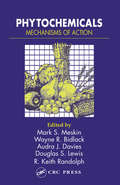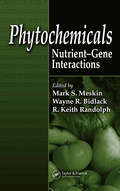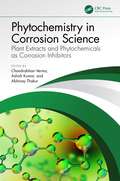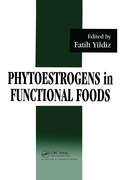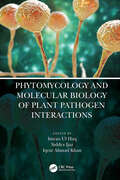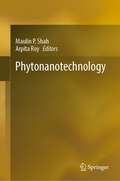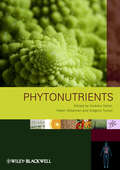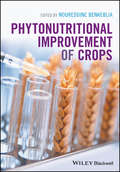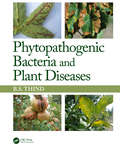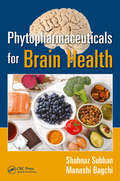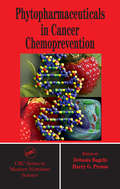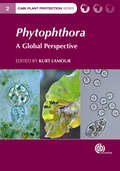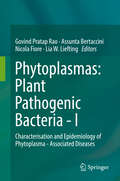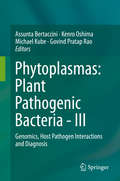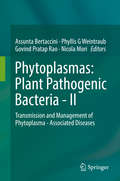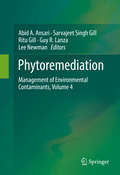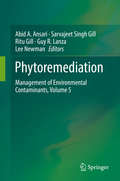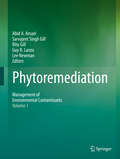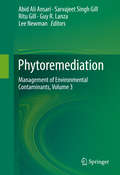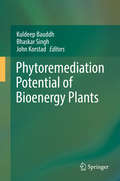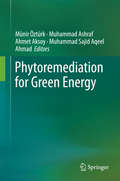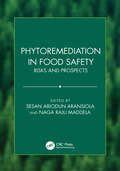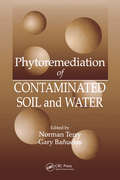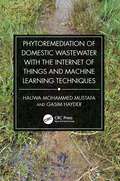- Table View
- List View
Phytochemicals: Mechanisms of Action
by R. Keith Randolph Mark S. Meskin Wayne R. Bidlack Audra J. Davies Douglas S. LewisPhytochemicals: Mechanisms of Action is the latest volume in a highly regarded series that addresses the roles of phytochemicals in disease prevention and health promotion. The text, an ideal tool for scientists and researchers in the fields of functional foods and nutraceuticals, links diets rich in plant-derived compounds, such as fruit, vegetabl
Phytochemicals: Nutrient-Gene Interactions
by R. Keith Randolph Mark S. Meskin Wayne R. BidlackUnderstanding phytochemical-gene interactions provides the basis for individualized therapies to promote health as well as prevent and treat disease. The authors of Phytochemicals: Nutrient-Gene Interactions examine the interactions between phytochemicals and the human genome and discuss the impact these interactions have on health, aging, a
Phytochemistry in Corrosion Science: Plant Extracts and Phytochemicals as Corrosion Inhibitors
by Chandrabhan VermaPhytochemistry in Corrosion Science covers the use of plant extracts/phytochemicals in corrosion mitigation with industrial applications. It explores innovative and characterization approaches toward the utilization of plant extracts and their phytochemicals as potential corrosion inhibitors for several metals and their alloys.Providing a comprehensive overview of the green aspects of plant extracts as corrosion inhibitors, this book discusses the preparation of aqueous and organic phase extracts, and their advantages, disadvantages, and use for different aggressive media. It also examines aqueous and organic extracts that have been successfully used as corrosion inhibitors for various metals and electrolyte combinations.This book will be a useful reference for undergraduate and graduate students and academic researchers in the fields of phytochemistry, corrosion science and engineering, environmental science, chemical engineering, green chemistry, and mechanical/industrial engineering.
Phytoestrogens In Functional Foods
by Fatih YildizPolyphenol phytoestrogens - bioactives found in specific foods and beverages - impart antioxidant, phytoestrogenic, antiproliferative, and enzyme modulating activities within the human metabolic system. It is believed that these compounds protect against several forms of cancer, cardiovascular and neurodegenerative diseases, osteoporosis, and menop
Phytomycology and Molecular Biology of Plant Pathogen Interactions
by Dr Imran Ul Haq Dr Siddra Ijaz Dr Iqrar Ahmad KhanPlants are exposed to highly diverse microbiota forming complex interactions in natural environments. Phytomycology and Molecular Biology of Plant Pathogen Interactions presents information on defense mechanisms of the plants, as various microbes can have positive effects on their plant hosts. Key Features Delineates the journey from Koch’s postulate to molecular systems biology. Provides comprehensive information on fungal biology, pathogenicity genes, and their expression while interacting with host plants. Highlights the techniques and approaches involved in phytofungi identification and detection. Describes multi-omics approaches and metabolic engineering in plant fungi. This book is beneficial to readers including plant scientists and researchers, particularly plant pathologists, molecular biologists, and mycologists.
Phytonanotechnology
by Maulin P. Shah Arpita RoyThis book provides essential information on the role of phytonanotechnology in the removal of environmental pollutants and covers recent advances in experimental and theoretical studies on plant-derived nanoparticles. It also discusses their current and potential applications and challenges.The combination of nanotechnology and phytoremediation, which is called phytonanotechnology, have the potential to remove contaminants from the environment or degrade them. The efficiency of contaminant removal can be improved by combining both methods as they are complementary to each other.Phytonanotechnology offers the advantages of increased bioavailability, prolongation of heavy metal absorption time, and multiple metal removal, all contributing to improved efficacy and decreased toxicity in plants and surroundings. Therefore, there is immense scope for nature-derived molecules to be formulated into nanotechnology-based phytoremediation approaches targeting the specific heavy metal removal from effluents and surroundings. This encourages research initiatives to synthesize more phytonanotechnology based uptake plant systems with high efficiency. Efficient formulation targeting strategies and the evaluation of targeting efficiency of phytonanotechnology, conforming to international standards of their toxicology and biocompatibility, could pave the way for heavy metal uptake and removal by plant-based systems.This book serves as a valuable resource for postgraduate students, environmental scientists and materials scientists in academia and corporate research.
Phytonutrients
by Andrew Salter Gregory Tucker Helen WisemanIn many Western diets, the role of plants has been reduced in favour of more animal-based products and this is now being cited more widely as being the cause of increases in the incidence of diseases such as cancer and cardiovascular disease. This important book covers the biochemistry and nutritional importance of a wide range of phytonutrients, including all the major macronutrients as well as the micronutrients and 'non-essential' nutrients. Phytonutrients is divided into three parts. The first deals with the role of plants in the human diet. Part II, representing the major part of the book covers in turn each of the major phytonutrient groups. Chapters include: non-lipid micronutrients, lipids and steroids, carotenoids, phenolics, vitamins C, E, folate/vitamin B12, phytoestrogens, other phytonutrients and minerals, and anti-nutritional factors. The final part of the book covers the methods used to manipulate levels of phytonutrients in the diet, such as fortification, supplementation and the use of genetically modified plants. Phytonutrients is an essential purchase for nutritionists, food scientists and plant biochemists, particularly those dealing with nutrients from plants, and their use in the human diet.
Phytonutritional Improvement of Crops
by Noureddine BenkebliaAn in-depth treatment of cutting-edge work being done internationally to develop new techniques in crop nutritional quality improvement Phytonutritional Improvement of Crops explores recent advances in biotechnological methods for the nutritional enrichment of food crops. Featuring contributions from an international group of experts in the field, it provides cutting-edge information on techniques of immense importance to academic, professional and commercial operations. World population is now estimated to be 7.5 billion people, with an annual growth rate of nearly 1.5%. Clearly, the need to enhance not only the quantity of food produced but its quality has never been greater, especially among less developed nations. Genetic manipulation offers the best prospect for achieving that goal. As many fruit crops provide proven health benefits, research efforts need to be focused on improving the nutritional qualities of fruits and vegetables through increased synthesis of lycopene and beta carotene, anthocyanins and some phenolics known to be strong antioxidants. Despite tremendous growth in the area occurring over the past several decades, the work has only just begun. This book represents an effort to address the urgent need to promote those efforts and to mobilise the tools of biotechnical and genetic engineering of the major food crops. Topics covered include: New applications of RNA-interference and virus induced gene silencing (VIGS) for nutritional genomics in crop plants Biotechnological techniques for enhancing carotenoid in crops and their implications for both human health and sustainable development Progress being made in the enrichment and metabolic profiling of diverse carotenoids in a range of fruit crops, including tomatoes, sweet potatoes and tropical fruits Biotechnologies for boosting the phytonutritional values of key crops, including grapes and sweet potatoes Recent progress in the development of transgenic rice engineered to massively accumulate flavonoids in-seed Phytonutritional Improvement of Crops is an important text/reference that belongs in all universities and research establishments where agriculture, horticulture, biological sciences, and food science and technology are studied, taught and applied.
Phytopathogenic Bacteria and Plant Diseases
by BS ThindThe field of Phytobacteriology is rapidly advancing and changing, because of recent advances in genomics and molecular plant pathology, but also due to the global spread of bacterial plant diseases and the emergence of new bacterial diseases. So, there is a need to integrate understanding of bacterial taxonomy, genomics, and basic plant pathology that reflects state-of-the-art knowledge about plant-disease mechanisms. This book describes seventy specific bacterial plant diseases and presents up-to-date classification of plant pathogenic bacteria. It would be of great help for scientists and researchers in conducting research on ongoing projects or formulation of new research projects. The book will also serve as a text book for advanced undergraduate and postgraduate students of disciplines of Phytobacteriology and Plant Pathology. Contains latest and updated information of plant pathogenic bacteria till December 2018 Describes seventy specific bacterial diseases Presents classification of the bacteria and associated nomenclature based on Bergey’s Manual Systematic Bacteriology and International Journal of Systematic and Evolutionary Microbiology Discusses practical and thoroughly tested disease management strategies that would help in controlling enormous losses caused by these plant diseases Reviews role of Type I-VI secretion systems and peptide- or protein-containing toxins produced by bacterial plant pathogens Briefs about plants and plant products that act as carriers of human enteric bacterial pathogens, like emphasizing role of seed sprouts as a common vehicle in causing food-borne illness Dr B. S. Thind was ex-Professor-cum-Head, Department of Plant Pathology, Punjab Agricultural University Ludhiana, India. He has 34 years of experience in teaching, research, and transfer of technology. He has conducted research investigations on bacterial blight of rice, bacterial stalk rot of maize, bacterial blight of cowpea, bacterial leaf spot of green gram, bacterial leaf spot of chillies and bacterial soft rot of potatoes. He also acted as Principal Investigator of two ICAR-funded research schemes entitled, "Detection and control of phytopathogenic bacteria from cowpea and mungbean seeds from 1981 to 1986 and "Perpetuation, variability, and control of Xanthomonas oryzae pv. oryzae, the causal agent of bacterial blight of rice" from 1989 to 1993, and also of a DST funded research scheme "Biological control of bacterial blight, sheath blight, sheath rot, and brown leaf spot of rice" from 1999 to 2002. He also authored a manual entitled, "Plant Bacteriology" and a text book entitled, "Phytopathogenic Procaryotes and Plant Diseases" published by Scientific Publishers (India). He is Life member of Indian Phytopathological Society, Indian Society of Plant Pathologists, Indian Society of Mycology and Plant Pathology, and Indian Science Congress Association.
Phytopharmaceuticals for Brain Health
by Manashi Bagchi Shahnaz SubhanResearch studies demonstrate diet and proper nutrition in conjunction with cognitive, mental, social, and physical activities can significantly help in improving brain health with advancing age, and potentially reduce the risk of cognitive decline. These studies of phytopharmaceuticals and medicinal plants, demonstrate the efficacy of Huperzine A, berry anthocyanins, trans-resveratrol, Ginkgo biloba, Bacopa monniera, Centella asiatica, tocotrienols, and palm oil in boosting brain health and physical well-being. In addition, consumption of marine fishes and general seafood is recommended for long-term nutritional intervention to preserve mental health, hinder neurodegenerative processes, and sustain cognitive capacities in humans. Omega-3 and omega-6 polyunsaturated fatty acids, n-3/n-6 PUFAs, flavonoids, and antioxidants prevent the initiation and progression of many neurological disorders. This book is a comprehensive review of phytopharmaceuticals impacting brain health with emphasis on diverse applications in food and nutrition sciences, biomedicine, neurology and other scientific and medical fields. It details available methods and contains numerous references making this the perfect guide for scientists who want to explore the fascinating world of phytopharmaceuticals with relation to brain health. Phytopharmaceuticals for Brain Health appeals to a diverse range of readers in industry, medical doctors, research and academia, including biologists, biochemists, food scientists, nutritionists and health professionals. Overall, this book brings a classic scenario of neurological problems to possible amelioration using novel nutraceuticals and functional foods.
Phytopharmaceuticals in Cancer Chemoprevention
by Harry G. Preuss Debasis BagchiDuring the past decade, a significant amount of research has been conducted on phytopharmaceuticals. Today, a growing body of evidence demonstrates the efficacy of a wide variety of natural products and affirms their potential in the treatment of cancer. Phytopharmaceuticals in Cancer Chemoprevention focuses on the role of natural supplemen
Phytophthora
by Frank Martin Greg Forbes Marco Thines Yilmaz Balci Yuanchao Wang Kurt Lamour Sylvia Patricia Fernández Pavía Mary Hausbeck Paul Bosland Thomas Jung Olaf Ribeiro Randy Ploetz Adrienne Hardham Janice Uchida Anne Dorrance Tibor Érsek Jan Nagel Dennis Halterman Soum Sanago Susan Miyasaka David Cooke Andre Drenth Rodrigo Ahumada Sabine WerresMembers of the genus Phytophthora cause serious damage to a huge array of plants. From the nineteenth century Irish potato famine to current widespread threats to forests and ecosystems in North and South America, Europe and Australia, the genus lives up to its reputation as the plant destroyer. This book provides an overview of Phytophthora species impacting crops, forests, nurseries, greenhouses and natural areas worldwide. Chapters cover major hosts, identification, epidemiology, management, current research, future perspectives and the impacts of globalization on Phytophthora. Phytophthora: A Global Perspective is an essential resource for researchers and extension workers in plant pathology and crop protection.
Phytophthora: A Global Perspective (Plant Science / Horticulture Ser. #2)
by Frank Martin Greg Forbes Marco Thines Yilmaz Balci Yuanchao Wang Sylvia Patricia Fernández Pavía Mary Hausbeck Paul Bosland Thomas Jung Olaf Ribeiro Randy Ploetz Adrienne Hardham Janice Uchida Anne Dorrance Tibor Érsek Jan Nagel Dennis Halterman Soum Sanago Susan Miyasaka David Cooke Andre Drenth Rodrigo Ahumada Sabine WerresMembers of the genus Phytophthora cause serious damage to a huge array of plants. From the nineteenth century Irish potato famine to current widespread threats to forests and ecosystems in North and South America, Europe and Australia, the genus lives up to its reputation as the plant destroyer. This book provides an overview of Phytophthora species impacting crops, forests, nurseries, greenhouses and natural areas worldwide. Chapters cover major hosts, identification, epidemiology, management, current research, future perspectives and the impacts of globalization on Phytophthora. Phytophthora: A Global Perspective is an essential resource for researchers and extension workers in plant pathology and crop protection.
Phytoplasmas: Characterisation And Epidemiology Of Phytoplasma - Associated Diseases
by Assunta Bertaccini Govind Pratap Rao Nicola Fiore Lia W. LieftingPhytoplasma-associated diseases are a major limiting factor to quality and productivity of many ornamentals, horticultural and other economically important agriculture crops worldwide. Annual losses due to phytoplasma diseases in many crops vary, but under the pathogen favorable conditions they always lead to disastrous consequences to farming community. As there is no effective cure for phytoplasma diseases, the management options emphasize on their exclusion, minimizing their spread by insect vectors and propagation materials and on development of host plant resistance. The phytoplasma associated plant diseases have a history of more than 50 years. Phytoplasmas have undoubtedly infected plants and cause diseases for centuries before they are described and proven to be the causal agents. But important progress related to identification of phytoplasmas only began after 1980’s. Phytoplasmas have emerged as the most serious constraints in the production of several crops all around the world during last four decades. Phytoplasmas constitute a major limiting factor to quality and productivity of cereals, horticultural, ornamentals and many other economically important crops all over the world. Annual losses due to phytoplasma diseases may vary, but under the pathogen favorable condition, phytoplasma disease may lead to disastrous consequences for farming and industry community. The scientific literature concerning phytoplasma occurrence, characterization, diagnosis, detection, and management is growing at a fast pace. Significant advancement in the last decades on diagnostic, biological and molecular properties, epidemiology, host-pathogen-insect interactions as well as management of phytoplasmas has been made. Till date, no authentic compilation is available to know the progress of phytoplasmas characterization major crops all over the world. The planned book will compile all the updated information available information on phytoplasmas by distinguished experts in the form of edited book entitled “Characterization and epidemiology of phytoplasma associated diseases”. The book covers recent and update information on emerging and re-emerging phytoplasma diseases affecting important crops in tropics and subtropics. It provides comprehensive information on disease distribution, occurrence, and identification of the phytoplasmas including the recent approaches for diagnostics, transmission, and information about losses and geographical distribution along with and management aspects. This volume contains 11-12 chapters contributed by the experienced and recognized experts working on different group of phytoplasmas affecting major crops all over the world. The information on various topics is at advanced as well as comprehensive level and provides the period wise developments of phytoplasma research. The book covers major chapters on an up to date progress of phytoplasma research, and then phytoplasma diseases associated with vegetable, pulse, oils crops, cereals, sugar crops, fruit crops, ornamentals, medicinal plants, palms species, forest tress and weeds. We have covered historical background, geographical distribution, identification and characterization, genetic diversity, host pathogen interaction and management aspects of important phytoplasma diseases infecting our major agricultural crops. The information on various topics is advanced as well as comprehensive, and provides thought provoking ideas for planning novel research ideas for future. This book will be useful to everyone interested in mollicutes, phytoplasma, spiroplasmas, plant pathology, disease control and plant biology and serve as an exhaustive and up-to-date compendium of references on various aspects of different groups of phytoplasmas affecting important crops worldwide.
Phytoplasmas: Genomics, Host Pathogen Interactions and Diagnosis
by Assunta Bertaccini Govind Pratap Rao Kenro Oshima Michael KubePhytoplasma III is the last of three books in the series covering all the aspects of phytoplasma-associated diseases. Phytoplasmas are a major limiting factor in the quality and productivity of many ornamental, horticultural and economically important agriculture crops worldwide, and losses due to phytoplasma diseases have disastrous consequences for farming communities. As there is no effective cure for these diseases, management strategies focus-on exclusion, minimizing their spread by insect vectors and propagation materials, and developing host plant resistance. This book provides an update on genomics, effectors and pathogenicity factors toward a better understanding of phytoplasma-host metabolic interactions. It offers a comprehensive overview of biological, serological and molecular characterization of the phytoplasmas, including recently developed approaches in diagnostics, such as transcriptomics studies, which have paved the way for analyzing the gene expression pattern in phytoplasmas on infection and revealed the up-regulation of genes associated with hormonal response, transcription factors, and signaling genes. Although phytoplasmas remain the most poorly characterized pathogens, recent studies have identified virulence factors that induce typical disease symptoms and have characterized the unique reductive evolution of the genome. Reviewing the advances in cultivation in axenic media together with the perspectives for future research to reduce the global incidence of these pathogens and the associated agricultural losses, the book is a valuable resource for plant pathologists, researchers in agriculture and PhD students.
Phytoplasmas: Transmission and Management of Phytoplasma - Associated Diseases
by Assunta Bertaccini Govind Pratap Rao Phyllis G Weintraub Nicola MoriPhytoplasma-associated diseases are a major limiting factor in the context of the quality and productivity of many ornamental, horticultural and other economically important agricultural crops worldwide. Annual losses due to phytoplasma diseases vary, but under pathogen-favorable conditions they have disastrous consequences for the farming community. As there is no effective cure for these diseases, the management options focus on their exclusion, minimizing their spread by insect vectors and propagation materials and on the development of host plant resistance.This book discusses the latest information on the epidemiology and management of phytoplasma-associated diseases, providing a comprehensive, up-to-date overview of distribution, occurrence and identification of the phytoplasmas, recent diagnostics approaches, transmission, losses and geographical distribution as well as management aspects.
Phytoremediation
by Sarvajeet Singh Gill Ritu Gill Guy R. Lanza Lee Newman Abid A. AnsariThis text details the plant-assisted remediation method, "phytoremediation," which involves the interaction of plant roots and associated rhizospheric microorganisms for the remediation of soil contaminated with high levels of metals, pesticides, solvents, radionuclides, explosives, crude oil, organic compounds and various other contaminants. Each chapter highlights and compares the beneficial and economical alternatives of phytoremediation to currently practiced soil removal and burial practices.
Phytoremediation
by Sarvajeet Singh Gill Ritu Gill Guy R. Lanza Lee Newman Abid A. AnsariThis text details the plant-assisted remediation method, phytoremediation, which involves the interaction of plant roots and associated rhizospheric microorganisms for the remediation of soil and water contaminated with high levels of metals, pesticides, solvents, radionuclides, explosives, nutrients, crude oil, organic compounds and various other contaminants. Each chapter highlights and compares the beneficial and economical alternatives of phytoremediation to currently practiced soil and water removal and burial practices. This book covers state of the art approaches in Phytoremediation written by leading and eminent scientists from around the globe. Phytoremediation: Management of Environmental Contaminants, Volume 1 supplies its readers with a multidisciplinary understanding in the principal and practical approaches of phytoremediation from laboratory research to field application. "
Phytoremediation
by Sarvajeet Singh Gill Ritu Gill Abid Ali Ansari Guy R. Lanza Lee NewmanThis text details the plant-assisted remediation method, "phytoremediation", which involves the interaction of plant roots and associated rhizospheric microorganisms for the remediation of soil contaminated with high levels of metals, pesticides, solvents, radionuclides, explosives, crude oil, organic compounds and various other contaminants. Each chapter highlights and compares the beneficial and economical alternatives of phytoremediation to currently practiced soil removal and burial practices. This book covers state of the art approaches in Phytoremediation written by leading and eminent scientists from around the globe. Phytoremediation: Management of Environmental Contaminants, Volume 1 supplies its readers with a multidisciplinary understanding in the principal and practical approaches of phytoremediation from laboratory research to field application.
Phytoremediation
by Sarvajeet Singh Gill Ritu Gill Abid Ali Ansari Guy R. Lanza Lee NewmanThis book details the plant-assisted remediation method, "phytoremediation", which involves the interaction of plant roots and associated rhizospheric microorganisms for the remediation of soil contaminated with high levels of metals, pesticides, solvents, radionuclides, explosives, crude oil, organic compounds and various other contaminants. Each chapter highlights and compares the beneficial and economical alternatives of phytoremediation to currently practiced soil removal and burial practices.
Phytoremediation Potential of Bioenergy Plants
by Bhaskar Singh Kuldeep Bauddh John KorstadThe globally escalating population necessitates production of more goods and services to fulfil the expanding demands of human beings which resulted in urbanization and industrialization. Uncontrolled industrialization caused two major problems - energy crisis and accelerated environmental pollution throughout the world. Presently, there are technologies which have been proposed or shown to tackle both the problems. Researchers continue to seek more cost effective and environmentally beneficial pathways for problem solving. Plant kingdom comprises of species which have the potential to resolve the couple problem of pollution and energy. Plants are considered as a potential feedstock for development of renewable energy through biofuels. Another important aspect of plants is their capacity to sequester carbon dioxide and absorb, degrade, and stabilize environmental pollutants such as heavy metals, poly-aromatic hydrocarbons, poly-aromatic biphenyls, radioactive materials, and other chemicals. Thus, plants may be used to provide renewable energy generation and pollution mitigation. An approach that could amalgamate the two aspects can be achieved through phytoremediation (using plants to clean up polluted soil and water), and subsequent generation of energy from the phyto-remediator plants. This would be a major advance in achieving sustainability that focuses on optimizing 'people' (social issues), 'planet' (environmental issues), and 'profit' (financial issues). The "Phytoremediation-Cellulosic Biofuels" (PCB) process will be socially beneficial through reducing pollution impacts on people, ecologically beneficial through pollution abatement, and economically viable through providing revenue that supplies an energy source that is renewable and also provides less dependence on importing foreign energy (energy-independence). The utilization of green plants for pollution remediation and energy production will also tackle some other important global concerns like global climate change, ocean acidification, and land degradation through carbon sequestration, reduced emissions of other greenhouse gases, restoration of degraded lands and waters, and more. This book addresses the overall potential of major plants that have the potential to fulfil the dual purposes of phytoremediation and energy generation. The non-edible bioenergy plants that are explored for this dual objective include Jatropha curcas, Ricinus communis, Leucaena leucocephalla, Milletia pinnata, Canabis sativa, Azadirachta indica, and Acacia nilotica. The book addresses all possible aspects of phyto-remediaton and energy generation in a holistic way. The contributors are one of most authoritative experts in the field and have covered and compiled the best content most comprehensively. The book is going to be extremely useful for researchers in the area, research students, academicians and also for policy makers for an inclusive understanding and assessment of potential in plant kingdom to solve the dual problem of energy and pollution.
Phytoremediation for Green Energy
by Münir Öztürk Muhammad Ashraf Ahmet Aksoy Muhammad Sajid Aqeel AhmadHuman demand for energy has grown multi-folds in recent years. This is the result of rapidly increasing human population, which, in turn, has resulted in increased organic (petroleum) and inorganic pollution on the biosphere. Due to this, we are now facing a number of challenges to sustain life on earth. For example, the increased organic and inorganic pollution in our environment is leading to loss of biodiversity, degradation of environment and thus ultimately causing food insecurity. In this situation, it is imperative to keep updated ourselves with advances on the effects of pollutants, tolerance mechanisms and the potential of different plants and microbes in removing these pollutants from the environment. For this purpose, we invited a number of scientists worldwide to review the current scenario of the problems, current development, and future prospects of the challenges and their solutions in an International Conference on ''Plants and Environmental Pollution'' held in KAYSERI, TURKEY from 6-11 July 2009. The output of this conference has been summarized in the form of this book.
Phytoremediation in Food Safety: Risks and Prospects
by Naga Raju Maddela Sesan Abiodun AransiolaPhytoremediation is the process that uses plants to remove pollutants from soils. These pollutants are stored in the edible parts of plants and, if they are consumed above a certain level, they become a health risk for humans and animals. This book is a critical review of phytoremediation, its direct or indirect effects on food products, and the risks posed by this cost-effective technology in food safety. It shows how different plants are suited for phytoremediation, explains the role of toxicants in the environment, and analyses their effects and risks in the food chain at a global level. It also reviews the extraction methods of toxicants from plants after they are exposed to phytoremediation.Features: Summarizes the phytoremediation technology for effective remediation Describes different types of pollutants in soils that render food products useless Identifies the role of phytoremediation in the environment and its advantages and disadvantages Explains the role of phytoexclusion and phytostabilization in foods and food safety Includes many case studies to describe the extraction protocols in postharvest for food safety This book is intended for practitioners in public and private companies involved in soil remediation and food production, as well as graduate students and academics, in both developed and developing countries, who are involved in soil and environmental sciences, the food industry, agriculture, and biotechnology.
Phytoremediation of Contaminated Soil and Water
by Norman Terry; Gary BañuelosPhytoremediation is an exciting, new technology that utilizes metal-accumulating plants to rid soil of heavy metal and radionuclides. Hyperaccumulation plants are an appealing and economical alternative to current methods of soil recovery. Phytoremediation of Contaminated Soil and Water is the most thorough literary examination of the subject available today.The successful implementation of phytoremediation depends on identifying plant material that is well adapted to specific toxic sites. Gentle remediation is then applied in situ, or at the contamination site. No soil excavation or transport is necessary. This severely contains the potential risk of the pollutants entering the food chain. And it's cost effective.The progress of modern man has created many sites contaminated with heavy metals. The effected land is toxic to plants and animals , which creates considerable public interest in remediation. But the commonly used remedies are ex situ, which poses an expensive dilemma and an even greater threat. Phytoremediation offers the prospect of a cheaper and healthier way to deal with this problem. Read Phytoremediation of Contaminated Soil and Water to learn just how far this burgeoning technology has developed.
Phytoremediation of Domestic Wastewater with the Internet of Things and Machine Learning Techniques
by Hauwa Mohammed Mustafa Gasim HayderPhytoremediation of Domestic Wastewater with the Internet of Things and Machine Learning Techniques highlights the most recent advances in phytoremediation of wastewater using the latest technologies. It discusses practical applications and experiences utilizing phytoremediation methods for environmental sustainability and the remediation of wastewater. It also examines the various interrelated disciplines relating to phytoremediation technologies and plots industry’s best practices to share this technology widely, as well as the latest findings and strategies. It serves as a nexus between artificial intelligence, environmental sustainability and bioremediation for advanced students and practising professionals in the field.
